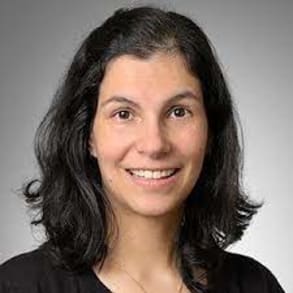Valeria Bohrt-Terceros, M.D., an endocrinologist at Sentara Princess Anne Hospital, discusses her area of focus, approach to care and the evolving field of diabetes.
My name is value, Bert. I am the new endocrinologist for Sentara Princess Anne. I actually trained at the VMS Andi after training five years ago. Plus, we moved to the Midwest on Ben. We started a family are actually our extended family was still here in the East Coast, so we wanted to be closer to them. So we came right back, and we are so excited to be here. So I am an internal medicine boarded physician. But I stopped specialized in endocrinology and metabolism. And what that means is I'm a specialist in diabetes and hormones for ease. Um, I take care of patients. Um, what diabetes of all kind. Type one type two diabetics. We manage devices related to their diseases on obviously hormones. Such a star oId a green all disease between terry problems, etcetera. Um, because of what I do, it's important for me to understand what the patients come here to see us. Um, I do understand that maybe for some of them, it feels like it always is the same answer or they need the same meds, but it's not really the same. Everybody needs something different in terms of getting encouraged. especially when it comes to treating any chronic disease. Chronic diseases I just have times are fatiguing on dso keeping working on it. I mean, consistent on it. Staying encouraged taking their meds, and why not? Is very important in Italy. So obviously signs always evolves. And that just makes us better trading out of patients on dykan tell you a little bit about what we have new coming down the pike in a couple different conditions. Um, always diabetes is an evolving field. Um, there is always, um, the science behind. Why are patients being diabetic? How toe prevent diabetes. Um, how we screening earlier? Obviously, um, how do we treat patients better and improve their blood sugars with new medications? Um, combination medications, pills and injectables? Um, along with diabetes, there's the management of obesity. Um, if we manage patients weights, if we help them lose weight, how can we prevent improve their outcomes and their conditions? A swell, um, in the same chapter off blood, sugars and diabetes? Um, there's a lot of new technology coming out that allow us to manage patients better, and not just a zone insulin pump, but glucose devices that allowed for monitoring or blood sugars. Um, that has come out fairly recent. There's a couple of new gadgets out there, Um, all of this together kind of aids as helping the patients achieve their goals. Um, on the thyroid cancer front. How have we reclassified the disease? Um, to make sure the patients have a more realistic outcome and not to over treat is always important. Who actually need surgery? How much surgery? Who would need extra treatment, such as radioactive iodine ablation on? How do we follow them? Um, how often do we do the screening and why not? Um, that's always great, especially when you have to treat anybody that the diagnosis carries cancer along with it for osteoporosis. Um, we had not had Medicaid new medication for a long time. Um, and now we have a couple of new drugs that actually have shown to improve the intensity a lot, a lot faster, um, than others. And so for patients that I have really low bone density readings, we're able to reel them back in into a less risky category for sure and decrease their risk off future fractures and other com abilities.
Related Presenters
